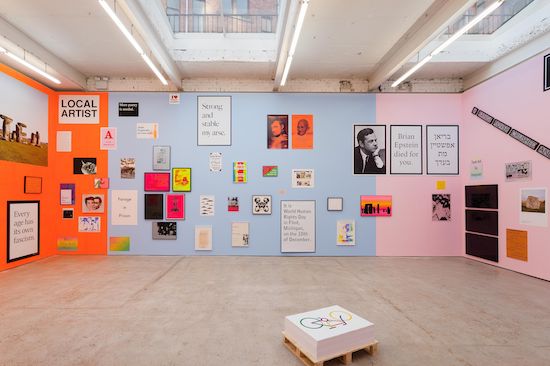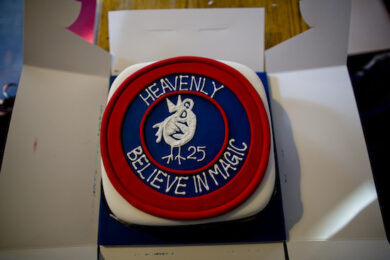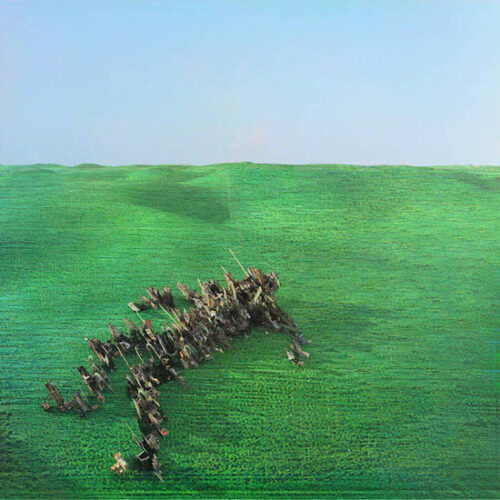Installation view, Jeremy Deller, ‘Warning Graphic Content’, The Modern Institute, Aird’s Lane, Glasgow, 2021. Photo: Patrick Jameson
Where have I seen that before? Walking around our major towns and cities, walking around most of the urban world these days, entails a near second by second exposure to a multitude of messages on walls, a near infinity of posters and graffiti markings, of flyers and stickers. Cities are littered with reading material posted onto doors, lampposts, old phone booths, postboxes, feeder pillars, anything that furnishes our streets. Street art: much of it banal, much of it boring. But then there are some interventions that truly snag: stark messages that stop you in your tracks. Make you think: who came up with that? Many are by Jeremy Deller, one of the modern masters: he demands attention must be paid to his pithy one-liners.
Back in April this year I saw one of his most effective examples on a trip to Glasgow. Near a busy bus stop was a message in huge blue letters on a white background: “Cronyism is English for Corruption”. That rang true – the way we’ve seen the deliberate dilution of meaning, of nastiness, by the use of a seemingly benign term like ‘crony’ or ‘banter’. But it was the word ‘English’ that really shocked.
Reading that slogan near the commercial centre of the Glasgow, reading this in Scotland, undoubtedly carried a charge. The message couldn’t help but imply, given its location, that the political elite of England (referencing the recent allegations of cash for peerages) are more specifically associated with venality. And in the current context of an unstable Union such a statement couldn’t avoid appearing inflammatory. Deller’s adage was also a short, sharp, reminder to the locals that it was the predominantly English vote that forced a reluctant Scotland into Brexit; the Scots were 62% in favour of Remain. And in COVID times too Deller’s poster prompted memories that ‘cronyism’ is the locution often bandied around allegations of profiteering and conflicts of interest as regards contracts for PPE.
Deller has been making posters for nearly thirty years now and his instincts are super-timely. His nous is sound; his methods recall the classic strategies of the Situationist International. He uses their tactic of détournement and frequently hijacks the limp clichés used by politicians. He then adds his own caustic spin – as with the Theresa May-baiting “Strong and Stable My Arse” done around the time of the election in 2017. Again you’d see this on walls in London whilst wandering around, your dreamy oblivion rudely interrupted by Deller’s reality.

Installation view, Jeremy Deller, ‘Warning Graphic Content’, The Modern Institute, Aird’s Lane, Glasgow, 2021. Photo: Patrick Jameson
His texts make prescient calls demanding we wake up. Even in these past few days another of his works has taken on a more poignant charge: “Thank God For Immigrants”. We recall the likes of Dr. Waheed Arian, one-time Afghani asylum seeker, and now a hard-pressed A+E doctor working for the NHS. Going along with immigration there’s Deller’s obsession with Stonehenge. I remember an edition he made a few years back (in 2013, I think) for the Glasgow International art festival, an image of the megaliths at sunset. And he referred to the ancient construction again in Glasgow when I was there earlier this year. On a wall on Aird’s Lane, not far from the Clyde, was a sign that read: “Stonehenge Built by Immigrants”. This was set on a red brick wall with the white and yellow text on a green background, the font done in imitation of U.K. road signs.
Do I have a personal favourite? I’d go for the one that reads ‘Tax Avoidance Kills’. Why? Because my old man was a tax inspector who rammed that maxim home as we grew up. Schools, sewers, public transport, the NHS, family benefits, unemployment benefits, student loans, the roads, the streets – it all had to be paid for. And if you were into tax fraud – if you bank, like the dodgers do, in the Caymans or the British Virgin Islands – this meant the Exchequer had less to play with, which meant less care for the needy. And that led to deaths: tax avoidance kills.
Going round and round on the London tube you’d also catch examples of Deller’s work. As part of the capital’s Art on the Underground series of commissions he combined an old picture of Gandhi with the subversive slogan (subversive given its readers were mainly commuters in a rush from A to B): ‘There is more to life than increasing its speed’. Sadly Deller had another disruptive work rejected by the Underground recently, an environmentally friendly proposal. His map cover image features a line drawing of a bicycle done in the colourings and circuit diagram style favoured by Harry Beck, the map’s original designer. Deller’s guide was not to be used.

Installation view, Jeremy Deller, ‘Warning Graphic Content’, The Modern Institute, Aird’s Lane, Glasgow, 2021. Photo: Patrick Jameson
Another route of exposure to Deller’s aphorisms came through personal encounters with the art world itself, and his own subversion of art fairs and the like. Deller has been scrupulous at making available cheap limited editions, art that is affordable. In October this year at the Frieze fair in London I caught sight of a door totally plastered by some of his stickers. Those that stuck in memory read: “I love Patrick Caulfield” and “Welcome to the Shitshow”, this on a Union Jack background. Then there was “Farage in Prison” on an orange dot, and “I Blame Zuck” in Facebook style lettering. All of these were found in a haphazard scatter on the door, a display that could be glanced at but also had the firm intent to halt the viewer.
I missed my chance to pick up a copy of “The History of the World” way back in 1997, Deller’s mind map linking Acid House and brass bands, Throbbing Gristle and 808 State, when it was on sale from Habitat. He also made limited editions with the non-profit Studio Voltaire; again I was way too late to get a hold of one. Similarly there was his “Roxy Music” seen back in 2010 at the Whitechapel gallery. This was an appropriated poster of the band in their early Eno prime, a much folded affair, tatty, with the band looking a tad scruffy and moody: faded glam incarnate.
Deller’s posters often reflect his catholic musical taste. He loves some of my own personal favourites as with his message “I Miss The World of Twist” and another image has their singer, the late, great, Tony Ogden in one of his action shot poses called “He’s a Rainbow”, a reference to the band’s cover of the Rolling Stones classic. Other posters have featured or referenced the likes of The Who, Madchester, Neil Young, The Kinks, Can, the Manic Street Preachers, and Brian Epstein. An alternative canon some might say: one that elevates those artists who have gone just that bit further out than most. People like Ogden and Joe Meek, Ian Curtis and Richey Edwards, Keith Moon and Brian Epstein. There’s a Morleyesque air of sacrifice: these men died for you.
An exhibition of Jeremy Deller’s posters, Warning Graphic Content, is at the Modern Institute, Glasgow, until 22 February





